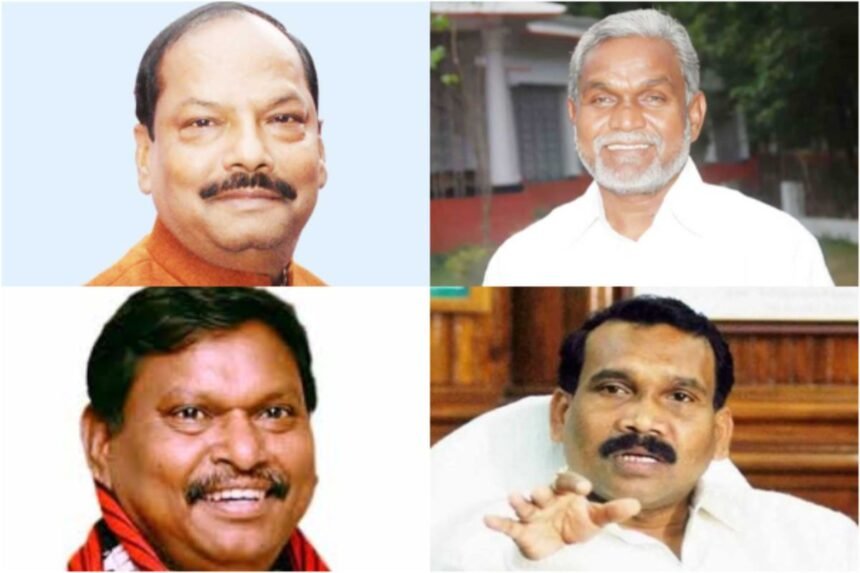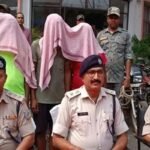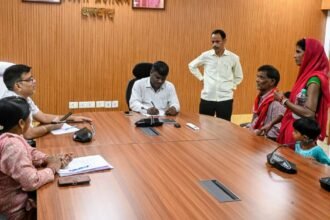Jharkhand Headlines Desk, October 21, 2024: The Bharatiya Janata Party (BJP) has announced its candidates for 66 out of 68 constituencies for the upcoming Jharkhand Assembly elections.
However, the party’s choice of candidates has led to accusations of nepotism, with many alleging that family ties played a significant role in ticket distribution. With four former Chief Ministers’ relatives contesting from various constituencies in the Kolhan region, the stakes are high, and the party faces an uphill battle to defend its strategy.
BJP’s Candidate List: A Mixed Reception
The BJP’s announcement of 66 candidates saw a blend of experienced and veteran politicians, reflecting the party’s confidence in its core leadership. However, two constituencies, Barhait and Tundi, remain undecided.
Tensions with alliance partner AJSU (All Jharkhand Students Union) over the Tundi seat have stalled the decision. It is evident that the Jharkhand BJP’s election committee, led by Shivraj Singh Chauhan, Himanta Biswa Sarma and Laxmikant Bajpai, has carefully curated the final candidate list, prioritizing strategic advantages. However, the party’s ticket distribution strategy has raised concerns, as it appears that local leaders’ influence was minimal.
Despite the strategic assembly of experienced candidates, the distribution process has attracted criticism for favoring the families of prominent politicians. Many local leaders who have served the party for years but lacked substantial grassroots support were overlooked, leading to frustrations within the party ranks.
Nepotism Accusations Haunt BJP
Accusations of nepotism have been at the forefront of controversies surrounding the BJP’s ticket allocation. Opponents have used this as an opportunity to accuse the party of promoting family dynasties, contradicting its stance against dynastic politics.
The controversy has intensified as several prominent leaders’ family members received tickets, raising questions about the fairness of the selection process.
The most notable cases include:
The inclusion of these candidates has raised eyebrows, with critics arguing that these selections were made to secure the influence of prominent leaders, thereby consolidating power within families rather than considering grassroots leaders’ eligibility.
Strategic Moves or Nepotism? The Debate Rages On
The BJP has defended its decisions, stating that the choice of candidates was based on their electoral viability rather than familial connections.
Sources within the party suggest that the inclusion of family members was a strategic move to ensure unity among influential leaders, avoiding potential internal conflicts that could arise from excluding them. The party’s internal assessment seems to have prioritized winnability over avoiding accusations of nepotism.
With four ex-Chief Ministers’ families now represented in the election, the stakes are higher than ever. While this strategy might ensure a united front, it has also exposed the party to criticism from the opposition, which has seized the opportunity to label BJP as hypocritical for allegedly contradicting its stance against family rule.
The Political Stakes in Kolhan: A Closer Look
The Kolhan region is expected to be a major battleground in the upcoming elections, as it holds significant political weight. With four high-profile candidates related to former Chief Ministers, the outcome in these constituencies could set the tone for the entire election.
Arjun Munda’s Influence in Potka
Meera Munda’s candidacy in Potka has drawn considerable attention, as it signals Arjun Munda’s attempt to solidify his influence in the region. Having served as the CM, Munda’s legacy is influential, and the decision to field his wife is seen as an effort to leverage that legacy to win votes.
The Return of Geeta Koda in Jagannathpur
Similarly, Geeta Koda’s candidacy in Jagannathpur brings back memories of her husband, Madhu Koda’s political career. Her nomination is viewed as a way to revive the Koda family’s political fortunes and consolidate their standing in the region.
Purnima Sahu’s Bid in Jamshedpur East
The candidacy of Purnima Sahu, Raghubar Das’s daughter-in-law, has been perhaps the most surprising. Das, who held the seat for years, has handed the baton to Sahu, aiming to maintain the family’s hold on Jamshedpur East. Critics argue that this move epitomizes the party’s shift towards familial loyalty over party merit.
Champai Soren’s Dual Stakes in Seraikela and Ghatsila
Lastly, Champai Soren’s presence in Seraikela, along with his son’s candidacy in Ghatsila, highlights a family-centric political approach. With both father and son contesting, the Sorens’ stakes in this election have escalated, and their success or failure will likely impact the party’s dynamics.
BJP’s Counter to Nepotism Allegations
Addressing the criticisms, BJP leaders have insisted that these selections are part of a broader strategy to field candidates with the best chances of winning. They argue that familial ties alone are not the deciding factor, rather, it is the candidates’ experience, popularity and familiarity with the constituencies that guided their nominations.
Additionally, the party has emphasized the need for unity among its top leaders, suggesting that including their family members helps maintain cohesion and minimizes factionalism.
Gender Strategy: Fielding Women Candidates
Interestingly, this election has also seen the BJP fielding 12 women candidates, a move perceived as an effort to balance the gender scale and attract female voters. One strategic decision was nominating Muniya Devi from Gandey, where she will be contesting against Kalpana Soren, the wife of Chief Minister Hemant Soren.
This move is seen as a direct counter-strategy to BJP’s loss in a by-election where female voters largely supported Kalpana Soren. By fielding another female candidate, the BJP hopes to shift the narrative and reclaim voter support in the area.
Challenges Ahead for BJP
Despite the party’s strategic defense, the accusations of nepotism may hinder its electoral prospects. Dissension within party ranks is evident, as some aspirants who did not receive tickets are considering rebellion.
The success of the BJP’s strategy now hinges on these family candidates’ ability to secure victory and silence internal and external critics. Failure to do so could fuel further claims that the party’s policies favor dynastic politics.
Conclusion: A High-Stakes Gamble
The BJP’s decision to field candidates with strong familial ties is a gamble that could either consolidate its hold in the Kolhan region or backfire, leading to internal strife and external backlash.
The party’s focus on strategic alliances and ensuring unity among top leaders may prove effective if the selected candidates manage to win their respective seats. However, the accusations of nepotism have opened the door for the opposition to challenge the BJP’s credibility and promises.
As the Jharkhand Assembly elections draw closer, the stakes for the BJP and the political landscape in Kolhan are high. How the electorate perceives these moves, and whether the party can maintain its narrative of strategic unity, will play a crucial role in shaping the election results.
Stay Updated with the Latest News in Jharkhand!
Be the first to know every important news, from Jharkhand Politics to Jharkhand News. We keep you prepared for every moment. Follow us for Breaking News in Jharkhand and never miss out on Jharkhand Trending Topics!
Stay connected with Jharkhand Headlines!






